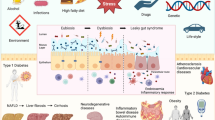Abstract
The etiology of cancer of the large bowel is in large part environmental. Both epidemiologic and experimental studies suggest that the environmental factor is dietary, specifically associated with a diet high in fat and low in fiber. Prevention is possible by altering these dietary factors, but the degree of change needed to accomplish it would be too drastic to be acceptable. However, the inclusion of certain additives in a diet only slightly modified with respect to the fat-fiber content may circumvent this problem. We have evidence that the addition of small amounts of representatives of three classes of cancer inhibitors (retinoids, plant steroids, and selenite) reduces intestinal cancer formation in rats by 50 per cent. This suggests that a diet with modest changes in the fat-fiber content plus the addition of certain inhibitors may be effective in reducing the incidence of cancer of the large bowel.
Similar content being viewed by others
References
Berenblum I. The cocarcinogenic action of croton resin. Cancer Res 1941;1:44–8.
Weinstein IB, Troll W. National Cancer Institute workshop on tumor promotion and cofactors in carcinogenesis. Cancer Res 1977;37:3461–3.
Weisburger JH, Reddy BS, Wynder EL. Colon cancer: its epidemiology and experimental production. Cancer 1977;40:2414–20.
Hill MJ, Drasar BS, Aries V, Crowther JS, Hawksworth G, Williams RE. Bacteria and aetiology of cancer of large bowel. Lancet 1971;1:95–100.
Druckrey H. Production of colonic carcinomas by 1, 2-dialkylhydrazines and azoxyalkanes. In: Burdette WJ, ed. Carcinoma of the colon and antecedent epithelium. Springfield: Charles C Thomas, 1970:267–79.
Nigro ND, Campbell RL, Singh DV, Lin YN. Effect of diet high in beef fat on the composition of fecal bile acids during intestinal carcinogenesis in the rat. J Natl Cancer Inst 1976;57:883–8.
Burkitt DP. Related disease—related cause? Lancet 1969;2:1229–30.
Nigro ND, Bull AW, Klopfer BA, Pak MS, Campbell RL. Effect of dietary fiber on azoxymethane-induced intestinal carcinogenesis in rats. J Natl Cancer Inst 1979;62:1097–1102.
Walker AR. Colon cancer and diet, with special reference to intakes of fat and fiber. Am J Clin Nutr 1976;29:1417–26.
Berenblum I. Cancer prevention as a realizable goal. Cancer 1981;47:2346–8.
Shamberger RJ, Willis CE. Selenium distribution and human cancer mortality. CRC Crit Rev Clin Lab Sci 1971;2:211–21.
Jacobs MM, Jansson B, Griffin AC. Inhibitory effect of selenium on 1,2-dimethylhydrazine and methylazoxymethanol acetate induction of colon tumors. Cancer Lett 1977;2:133–8.
Soullier BK, Wilson PS, Nigro ND. Effect of selenium on azoxymethane-induced intestinal cancer in rats fed high fat diet. Cancer Lett 1981;12:343–8.
Sporn M. Retinoids and cancer prevention. In: Carcinogenesis: a comprehensive survey. New York: Raven Press, 1980;5:99–109.
Newberne PM, Rogers AE. Rat colon carcinomas associated with aflatoxin and marginal vitamin A. J Natl Cancer Inst 1973;50:439–48.
Rogers AE, Herndon BJ, Newberne PM. Induction by dimethylhydrazine of intestinal carcinoma in normal rats and rats fed high or low levels of vitamin A. Cancer Res 1973;33:1003–9.
Narisawa T, Reddy BS, Wong CQ, Weisburger JH. Effect of vitamin A deficiency on rat colon carcinogenesis by N-methyl-N′-nitro-N-nitrosoguanidine. Cancer Res 1976;36:1379–83.
Cohen BI, Raicht RF. Plant sterols: protective role in chemical carcinogenesis. In: Zedeck MS, Lipkin, M, eds. Inhibition of tumor induction and development. New York: Plenum Press, 1981:189–201.
Raicht RF, Cohen BI, Fazzini EP, Sarwal AN, Takahashi M. Protective effect of plant sterols against chemically induced colon tumors in rats. Cancer Res 1980;40:403–5.
Nigro ND, Bull AW, Wilson PS, Soullier BK, Alousi MA. Combined inhibitors of carcinogenesis: effect on azoxymethane-induced intestinal cancer in rats. J Natl Cancer Inst. (In press.)
Author information
Authors and Affiliations
Additional information
Read at the meeting of the American Society of Colon and Rectal Surgeons, San Francisco, California, May 2 to 6, 1982. This paper received the New York Society of Colon and Rectal Surgeon's Award.
Supported by the Matilda R. Wilson Fund.
About this article
Cite this article
Nigro, N.D. A strategy for prevention of cancer of the large bowel. Dis Colon Rectum 25, 755–758 (1982). https://doi.org/10.1007/BF02553306
Issue Date:
DOI: https://doi.org/10.1007/BF02553306




